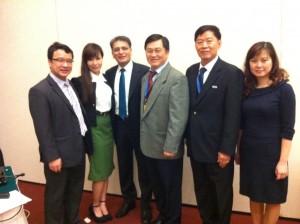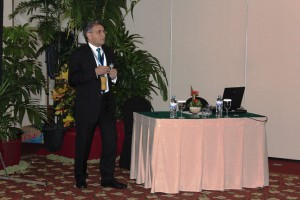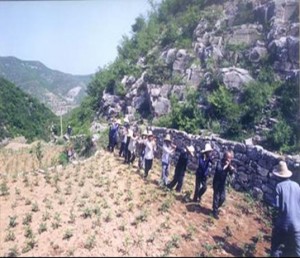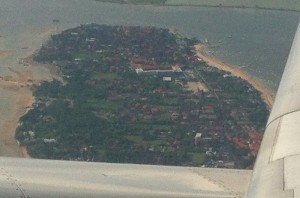Such is the importance being given to Universal Service and Broadband all over the world that if you look at the APEC TEL Strategic Action Plan: 2010-2015*, the very first item is: 
Supposedly APEC-TEL 47 will generate recommendations that will be presented to the APEC-TELMIN (council of TELecom MINisters). The TELMIN will form their own recommendations which will become part of the agenda of APEC Summit to be held in BALI in November 2013. President Obama is expected to be one of the 21 leaders who will participate. Preparations are already going on for the summit (the brand new airport terminal building will also open in time). For Indonesians it holds special meanings as President Obama spent part of his childhood in Indonesia.
The very first day was this full-day session on USF with about a dozen speakers from different countries – Vietnam, Japan, China, Indonesia, Malaysia, Thailand, Brunei, USA, South Korea, and so on. One could hear about various solutions 
For the first time I came to know of the scheme in South Korea, where they have a very interesting model of a “Virtual USF”. There is no real fund as such and what they do is that the losses of the operators who provide services to the designated PNLAs (Potential Net Loss Areas) are compensated up to 70% by rest of the operators. The total compensation amount that is settled is a result of “bargaining” among themselves (yes there is actually bargaining). The contributions are in proportion to their revenues. Consequently there is no USF administration because it is just an accounting matter and there are a couple of persons in the Ministry who are assigned to co-ordinate.
The Japanese too have a different model and they also compensate the losses of providing services to people living in remote/high cost areas, or people with disabilities, or for emergency lines and payphones. If the cost of providing such service is above the National Average Cost + 20, then that is loss! The basis of contributions is not pegged to revenues but to numbers of subscribers that the contributing carrier holds. Calculation is based on a per subscriber per month rate. The Japanese have not yet made Broadband as their target Universal Service. They say that first there has to be a considerable increase in broadband utilization rates and then a national consensus has to be reached!
I found the presentation of United States USF also interesting. It is one the oldest and biggest USFs (2012 disbursements US$ 8.7 Bil). They too strive to provide affordable services (incl Broadband) to rural and high cost areas (about 50% goes there), advance telecom services to schools and libraries (about 25%) and remaining to ‘life-line’ plus rural health care facilities. The contribution factor is announced quarterly. Currently it comes to approx. $1.2 per line, per month. US has the reputation of a costly administration (USAC) and a complex mechanism, whereby a substantial amount of the money collected is spent in USAC itself.
USO mechanisms of several other countries (Vietnam, Brunei, Malaysia, Thailand, Indonesia, etc.) were well presented 
For me it was interesting to hear presenters from Thailand (Mr Channarukul) and Indonesia (Ibu Woro) tell the audience that they are in the process of reforming their USOFs. Thailand is about to launch a pilot under the new bidding scheme and in the next three years they intend to auction USF projects worth half a billion dollars, mainly broadband – a part of Smart Thailand program. Similarly Indonesia is in the process of reforming their USO. ‘Palapa Ring’ undersea Optic Fiber Cable project is already under way aiming to build a fiber optic network that will connect all the 497 districts/cities to support broadband.
What was exciting for me (again!) was that I am involved as a USF consultant
in both the above named countries. It does give a bit of satisfaction of being useful to some – if not to own people!



Parvez,
Thank you for such an interesting and engaging report on your APEX TEL visit….. also very informative on USO funding methods being employed in S. Korea and Japan. I was also interested to hear about the developments in Indonesia. As you know, last year I spent some very enjoyable time with Ibu Koesmarihati, Ibu Woro and others, assisting with some aspects of USF regulation and preparations for the Eastern Palapa Ring Project …. that was the last time our paths crossed in conference and I wish that happened more often! But in any case, APEC TEL made a good choice to have you as an expert.
Yes, I remember we met in Jakarta fregarding this topic. Well, it is finally working out, which is good news. But there’s still many a slip …
Thanks for sharing your experience with the APEC TEL. Great to know that you continue to make real difference to millions of lives.
It is quite unfortunate though that due to self-seeking priorities of our politicians Pakistan has been deprived of making the best use of your capabilities. You’ve very aptly put it in your last sentence ” It does give a bit of satisfaction of being useful to some – if not to own people!”
Very interesting script.
You are doing an excellent job; we all are proud of you. Your tremendous contribution in this field is duly recognized in the other parts of the world. It is hard luck for our country men that gifted professionals of your caliber are not encouraged to exercise their expertise for their homeland….
Good luck in your future assignments.
Very interesting script.
You are doing an excellent job; we all are proud of you. Your tremendous contribution in this field is duly recognized in the other parts of the world. It is hard luck for our countrymen that gifted professionals of your caliber are not encouraged to exercise their expertise for their homeland….
Good luck in your future assignments.
Pervez Sb
Very interesting article as it gives one the appericiation of how to overcome challenges of briding the technology divide in developing and developed countires and different approaches to resolving the same opportunity – truly technology can help eleviate the miseries of poor and help offer them opportunities to make a difference in their life – you are indeed making a difference in a different way by not only represeting the country well but sharing the experiences of others – well written article….Thanks
Nauman
Excellent report.
I can see that many innovative mechanisms are being implemented in different countries, while others are bring about improvement in the existing programs. Looking forward to hear from you on the GSMA report on USF.
I can understand the sentiment in the last sentence. I went through the same feeling conducting a training session on Long Term evolution at Qualcomm HQ, San Diego, USA on April 9, 2013.
Enjoyed your company and discussion on the flight from Islamabad to Bangkok.
Excellent report.